Business Law for Managers: Directors' Duties and Responsibilities
VerifiedAdded on 2020/10/23
|12
|3670
|110
Report
AI Summary
This report provides a detailed analysis of a business law case involving Adam and James, directors of DIG plc, who formed a new company, MINE Ltd., and secured a contract originally sought by DIG plc. The report explores the legal issues arising from their actions, particularly focusing on the fiduciary nature of a director's office and the duties owed to the company as per the Companies Act 2006. It examines the roles of directors, including their eligibility, removal, and responsibilities under sections 154, 157, 170, 174, 175, and 260 of the Companies Act 2006. The report highlights the importance of avoiding conflicts of interest, the consequences of breaching duties, and the rights of the company against directors. The analysis includes relevant case law and emphasizes the legal framework governing directors' conduct in the UK, aiming to provide a comprehensive understanding of the legal obligations and potential liabilities of company directors.
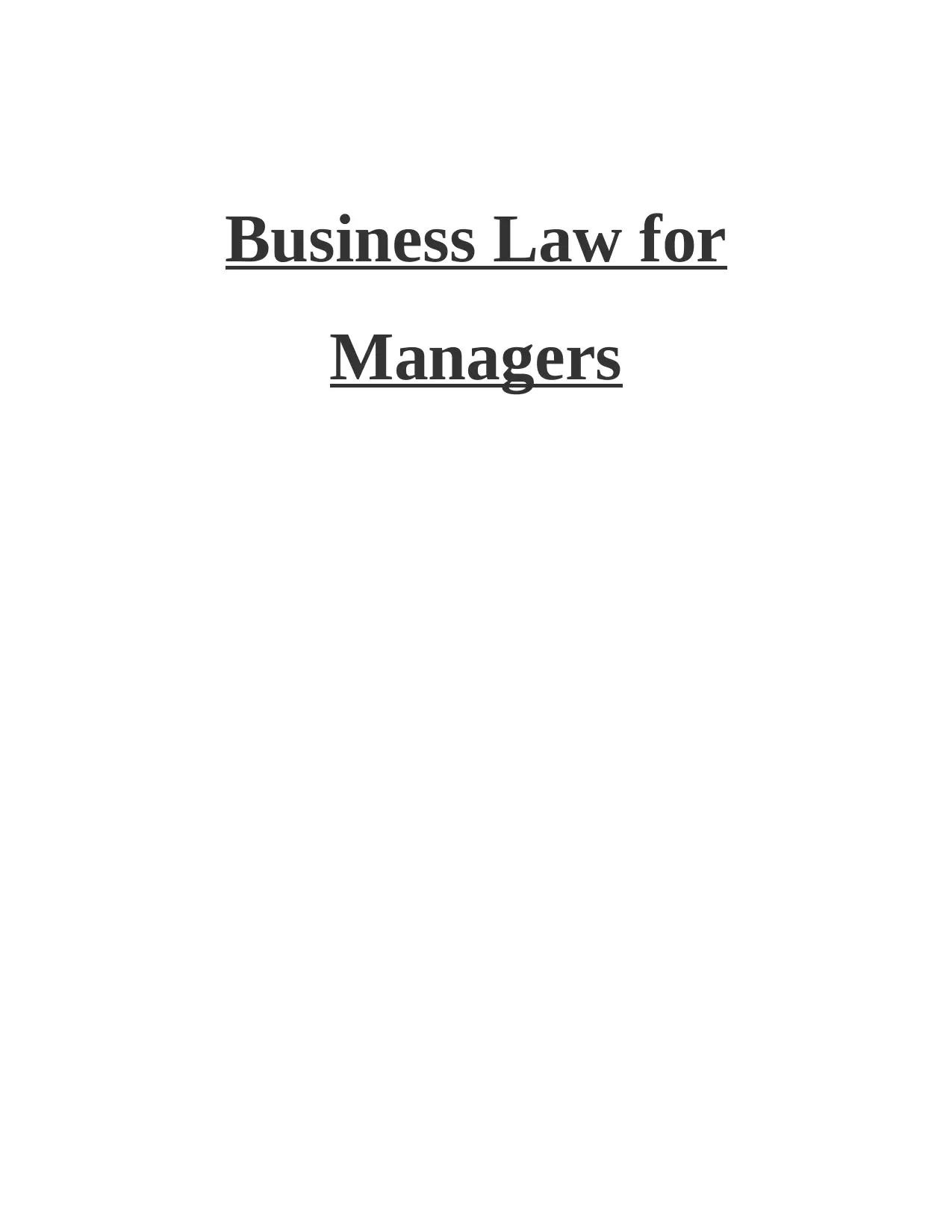
Business Law for
Managers
Managers
Paraphrase This Document
Need a fresh take? Get an instant paraphrase of this document with our AI Paraphraser
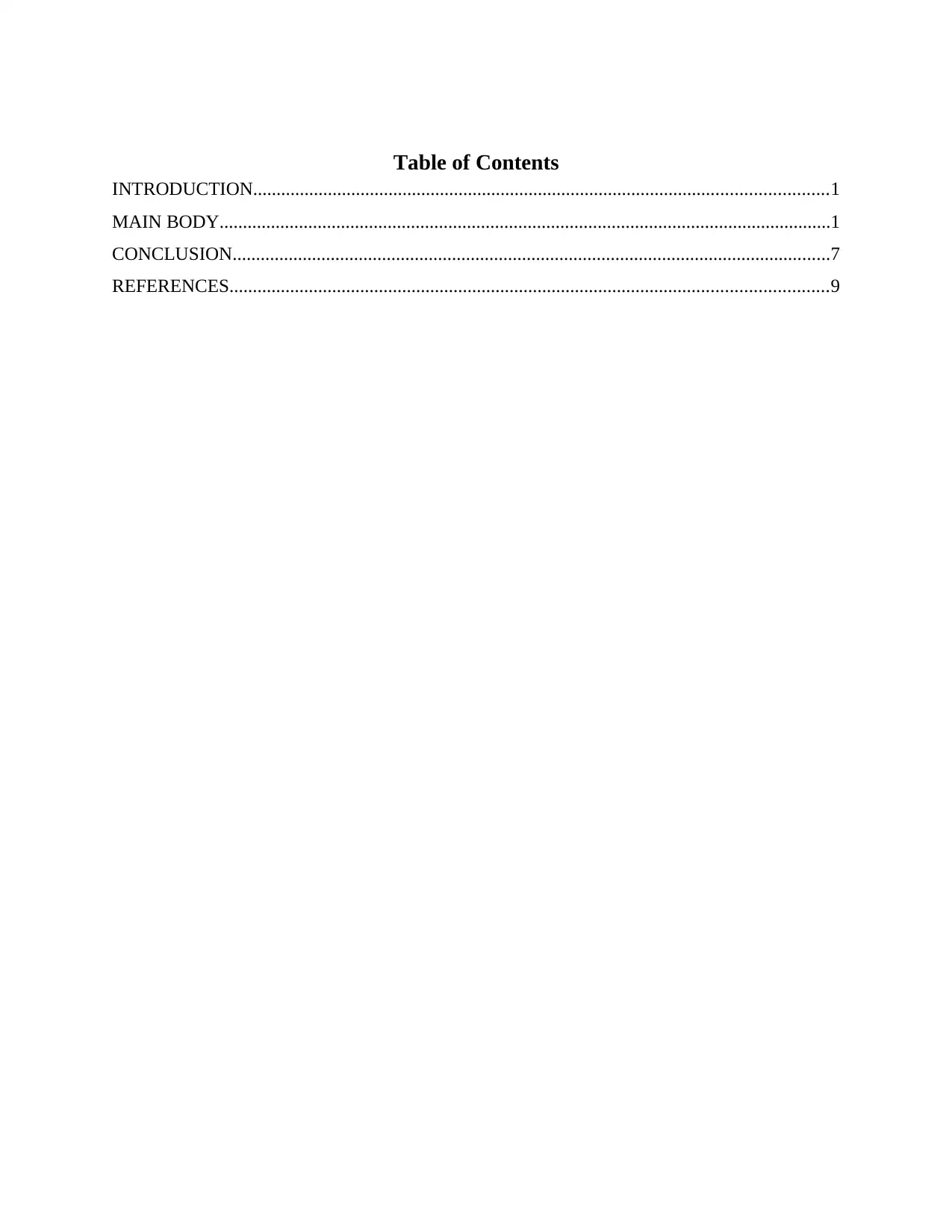
Table of Contents
INTRODUCTION...........................................................................................................................1
MAIN BODY...................................................................................................................................1
CONCLUSION................................................................................................................................7
REFERENCES................................................................................................................................9
INTRODUCTION...........................................................................................................................1
MAIN BODY...................................................................................................................................1
CONCLUSION................................................................................................................................7
REFERENCES................................................................................................................................9
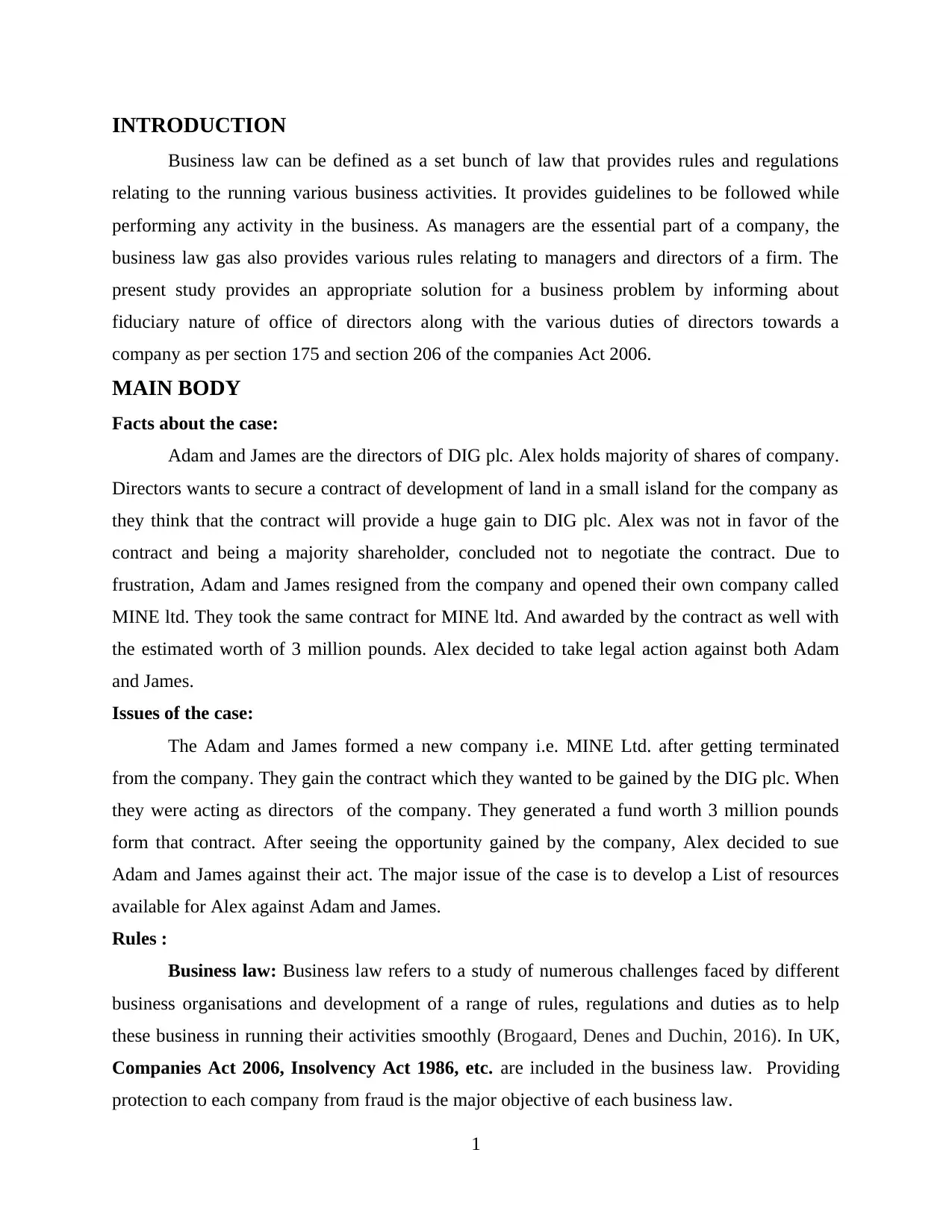
INTRODUCTION
Business law can be defined as a set bunch of law that provides rules and regulations
relating to the running various business activities. It provides guidelines to be followed while
performing any activity in the business. As managers are the essential part of a company, the
business law gas also provides various rules relating to managers and directors of a firm. The
present study provides an appropriate solution for a business problem by informing about
fiduciary nature of office of directors along with the various duties of directors towards a
company as per section 175 and section 206 of the companies Act 2006.
MAIN BODY
Facts about the case:
Adam and James are the directors of DIG plc. Alex holds majority of shares of company.
Directors wants to secure a contract of development of land in a small island for the company as
they think that the contract will provide a huge gain to DIG plc. Alex was not in favor of the
contract and being a majority shareholder, concluded not to negotiate the contract. Due to
frustration, Adam and James resigned from the company and opened their own company called
MINE ltd. They took the same contract for MINE ltd. And awarded by the contract as well with
the estimated worth of 3 million pounds. Alex decided to take legal action against both Adam
and James.
Issues of the case:
The Adam and James formed a new company i.e. MINE Ltd. after getting terminated
from the company. They gain the contract which they wanted to be gained by the DIG plc. When
they were acting as directors of the company. They generated a fund worth 3 million pounds
form that contract. After seeing the opportunity gained by the company, Alex decided to sue
Adam and James against their act. The major issue of the case is to develop a List of resources
available for Alex against Adam and James.
Rules :
Business law: Business law refers to a study of numerous challenges faced by different
business organisations and development of a range of rules, regulations and duties as to help
these business in running their activities smoothly (Brogaard, Denes and Duchin, 2016). In UK,
Companies Act 2006, Insolvency Act 1986, etc. are included in the business law. Providing
protection to each company from fraud is the major objective of each business law.
1
Business law can be defined as a set bunch of law that provides rules and regulations
relating to the running various business activities. It provides guidelines to be followed while
performing any activity in the business. As managers are the essential part of a company, the
business law gas also provides various rules relating to managers and directors of a firm. The
present study provides an appropriate solution for a business problem by informing about
fiduciary nature of office of directors along with the various duties of directors towards a
company as per section 175 and section 206 of the companies Act 2006.
MAIN BODY
Facts about the case:
Adam and James are the directors of DIG plc. Alex holds majority of shares of company.
Directors wants to secure a contract of development of land in a small island for the company as
they think that the contract will provide a huge gain to DIG plc. Alex was not in favor of the
contract and being a majority shareholder, concluded not to negotiate the contract. Due to
frustration, Adam and James resigned from the company and opened their own company called
MINE ltd. They took the same contract for MINE ltd. And awarded by the contract as well with
the estimated worth of 3 million pounds. Alex decided to take legal action against both Adam
and James.
Issues of the case:
The Adam and James formed a new company i.e. MINE Ltd. after getting terminated
from the company. They gain the contract which they wanted to be gained by the DIG plc. When
they were acting as directors of the company. They generated a fund worth 3 million pounds
form that contract. After seeing the opportunity gained by the company, Alex decided to sue
Adam and James against their act. The major issue of the case is to develop a List of resources
available for Alex against Adam and James.
Rules :
Business law: Business law refers to a study of numerous challenges faced by different
business organisations and development of a range of rules, regulations and duties as to help
these business in running their activities smoothly (Brogaard, Denes and Duchin, 2016). In UK,
Companies Act 2006, Insolvency Act 1986, etc. are included in the business law. Providing
protection to each company from fraud is the major objective of each business law.
1
⊘ This is a preview!⊘
Do you want full access?
Subscribe today to unlock all pages.

Trusted by 1+ million students worldwide
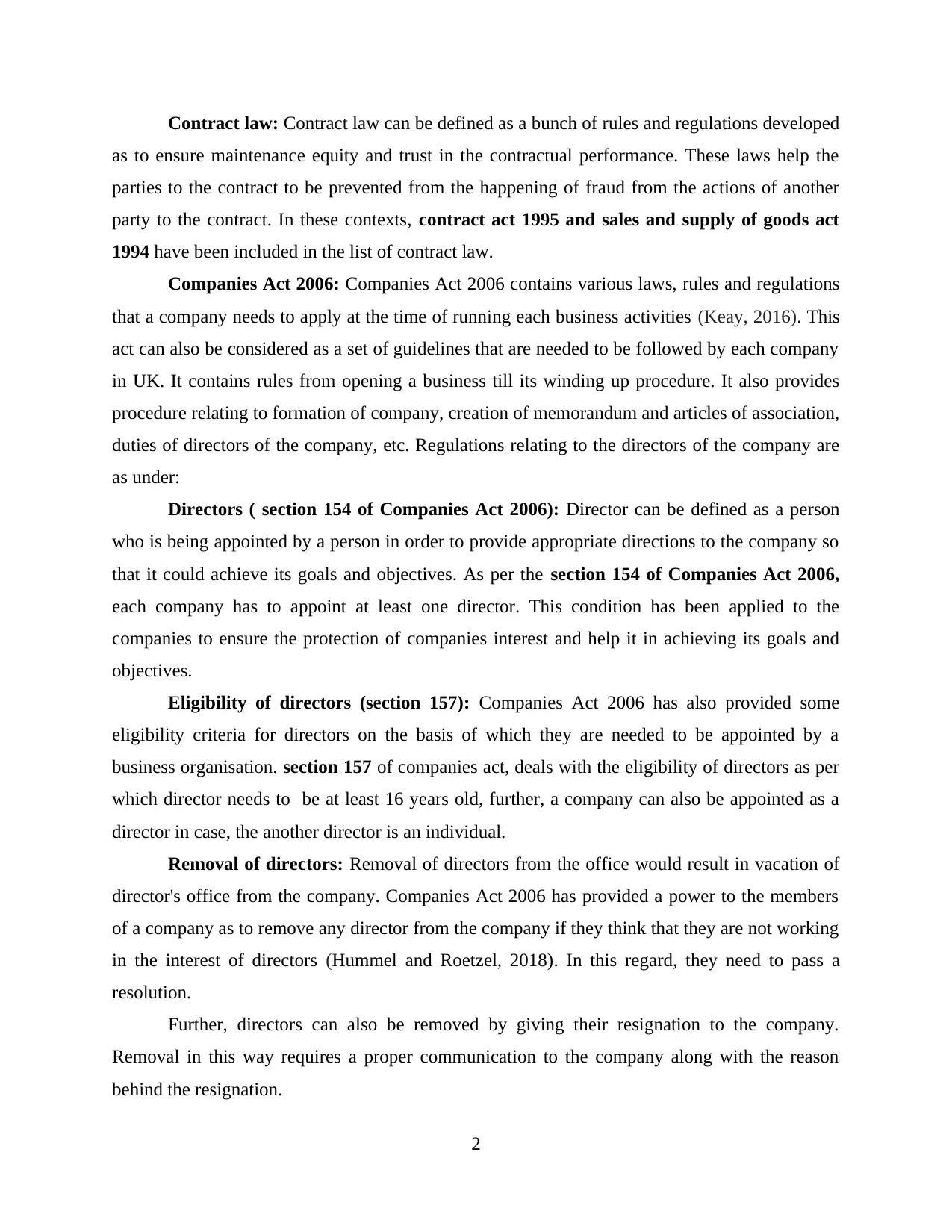
Contract law: Contract law can be defined as a bunch of rules and regulations developed
as to ensure maintenance equity and trust in the contractual performance. These laws help the
parties to the contract to be prevented from the happening of fraud from the actions of another
party to the contract. In these contexts, contract act 1995 and sales and supply of goods act
1994 have been included in the list of contract law.
Companies Act 2006: Companies Act 2006 contains various laws, rules and regulations
that a company needs to apply at the time of running each business activities (Keay, 2016). This
act can also be considered as a set of guidelines that are needed to be followed by each company
in UK. It contains rules from opening a business till its winding up procedure. It also provides
procedure relating to formation of company, creation of memorandum and articles of association,
duties of directors of the company, etc. Regulations relating to the directors of the company are
as under:
Directors ( section 154 of Companies Act 2006): Director can be defined as a person
who is being appointed by a person in order to provide appropriate directions to the company so
that it could achieve its goals and objectives. As per the section 154 of Companies Act 2006,
each company has to appoint at least one director. This condition has been applied to the
companies to ensure the protection of companies interest and help it in achieving its goals and
objectives.
Eligibility of directors (section 157): Companies Act 2006 has also provided some
eligibility criteria for directors on the basis of which they are needed to be appointed by a
business organisation. section 157 of companies act, deals with the eligibility of directors as per
which director needs to be at least 16 years old, further, a company can also be appointed as a
director in case, the another director is an individual.
Removal of directors: Removal of directors from the office would result in vacation of
director's office from the company. Companies Act 2006 has provided a power to the members
of a company as to remove any director from the company if they think that they are not working
in the interest of directors (Hummel and Roetzel, 2018). In this regard, they need to pass a
resolution.
Further, directors can also be removed by giving their resignation to the company.
Removal in this way requires a proper communication to the company along with the reason
behind the resignation.
2
as to ensure maintenance equity and trust in the contractual performance. These laws help the
parties to the contract to be prevented from the happening of fraud from the actions of another
party to the contract. In these contexts, contract act 1995 and sales and supply of goods act
1994 have been included in the list of contract law.
Companies Act 2006: Companies Act 2006 contains various laws, rules and regulations
that a company needs to apply at the time of running each business activities (Keay, 2016). This
act can also be considered as a set of guidelines that are needed to be followed by each company
in UK. It contains rules from opening a business till its winding up procedure. It also provides
procedure relating to formation of company, creation of memorandum and articles of association,
duties of directors of the company, etc. Regulations relating to the directors of the company are
as under:
Directors ( section 154 of Companies Act 2006): Director can be defined as a person
who is being appointed by a person in order to provide appropriate directions to the company so
that it could achieve its goals and objectives. As per the section 154 of Companies Act 2006,
each company has to appoint at least one director. This condition has been applied to the
companies to ensure the protection of companies interest and help it in achieving its goals and
objectives.
Eligibility of directors (section 157): Companies Act 2006 has also provided some
eligibility criteria for directors on the basis of which they are needed to be appointed by a
business organisation. section 157 of companies act, deals with the eligibility of directors as per
which director needs to be at least 16 years old, further, a company can also be appointed as a
director in case, the another director is an individual.
Removal of directors: Removal of directors from the office would result in vacation of
director's office from the company. Companies Act 2006 has provided a power to the members
of a company as to remove any director from the company if they think that they are not working
in the interest of directors (Hummel and Roetzel, 2018). In this regard, they need to pass a
resolution.
Further, directors can also be removed by giving their resignation to the company.
Removal in this way requires a proper communication to the company along with the reason
behind the resignation.
2
Paraphrase This Document
Need a fresh take? Get an instant paraphrase of this document with our AI Paraphraser
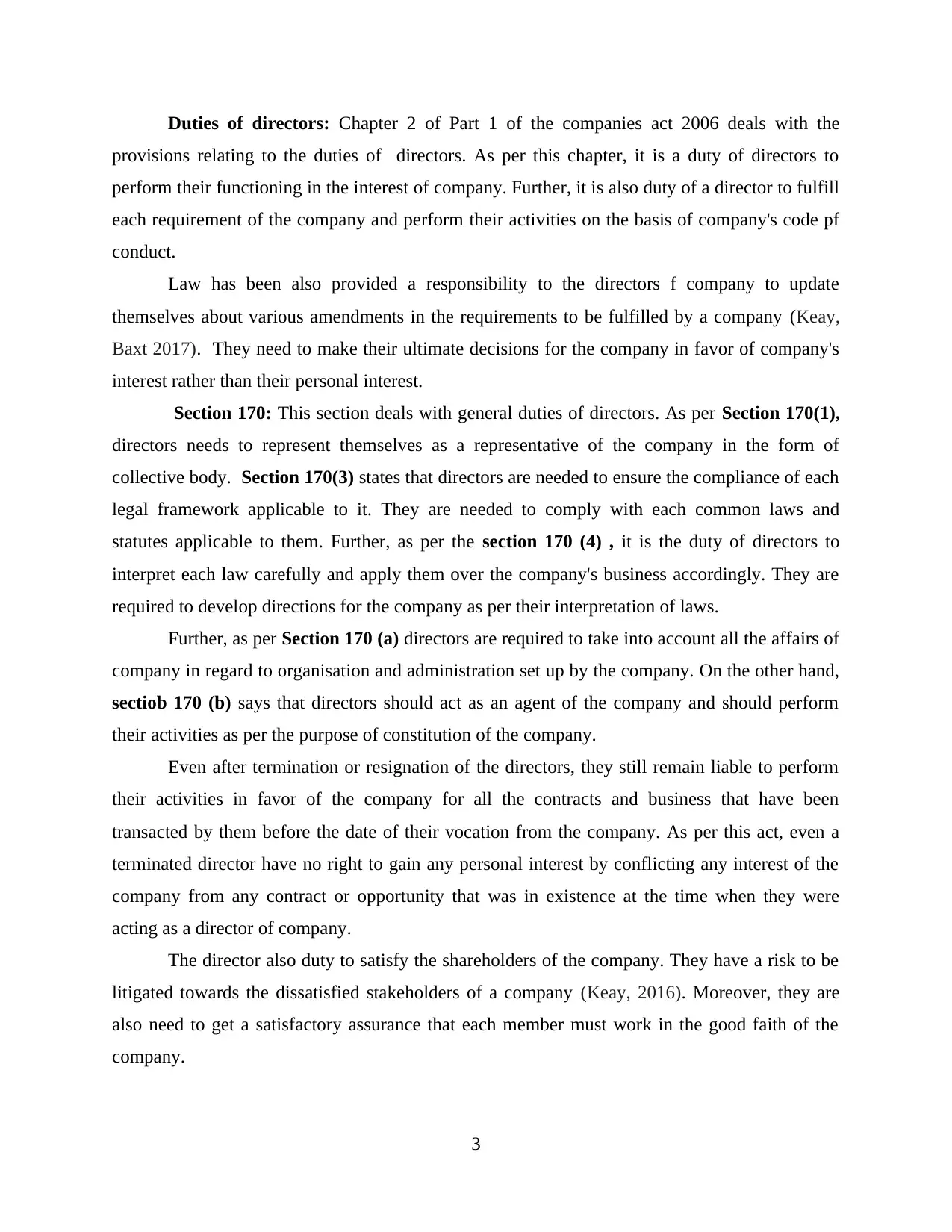
Duties of directors: Chapter 2 of Part 1 of the companies act 2006 deals with the
provisions relating to the duties of directors. As per this chapter, it is a duty of directors to
perform their functioning in the interest of company. Further, it is also duty of a director to fulfill
each requirement of the company and perform their activities on the basis of company's code pf
conduct.
Law has been also provided a responsibility to the directors f company to update
themselves about various amendments in the requirements to be fulfilled by a company (Keay,
Baxt 2017). They need to make their ultimate decisions for the company in favor of company's
interest rather than their personal interest.
Section 170: This section deals with general duties of directors. As per Section 170(1),
directors needs to represent themselves as a representative of the company in the form of
collective body. Section 170(3) states that directors are needed to ensure the compliance of each
legal framework applicable to it. They are needed to comply with each common laws and
statutes applicable to them. Further, as per the section 170 (4) , it is the duty of directors to
interpret each law carefully and apply them over the company's business accordingly. They are
required to develop directions for the company as per their interpretation of laws.
Further, as per Section 170 (a) directors are required to take into account all the affairs of
company in regard to organisation and administration set up by the company. On the other hand,
sectiob 170 (b) says that directors should act as an agent of the company and should perform
their activities as per the purpose of constitution of the company.
Even after termination or resignation of the directors, they still remain liable to perform
their activities in favor of the company for all the contracts and business that have been
transacted by them before the date of their vocation from the company. As per this act, even a
terminated director have no right to gain any personal interest by conflicting any interest of the
company from any contract or opportunity that was in existence at the time when they were
acting as a director of company.
The director also duty to satisfy the shareholders of the company. They have a risk to be
litigated towards the dissatisfied stakeholders of a company (Keay, 2016). Moreover, they are
also need to get a satisfactory assurance that each member must work in the good faith of the
company.
3
provisions relating to the duties of directors. As per this chapter, it is a duty of directors to
perform their functioning in the interest of company. Further, it is also duty of a director to fulfill
each requirement of the company and perform their activities on the basis of company's code pf
conduct.
Law has been also provided a responsibility to the directors f company to update
themselves about various amendments in the requirements to be fulfilled by a company (Keay,
Baxt 2017). They need to make their ultimate decisions for the company in favor of company's
interest rather than their personal interest.
Section 170: This section deals with general duties of directors. As per Section 170(1),
directors needs to represent themselves as a representative of the company in the form of
collective body. Section 170(3) states that directors are needed to ensure the compliance of each
legal framework applicable to it. They are needed to comply with each common laws and
statutes applicable to them. Further, as per the section 170 (4) , it is the duty of directors to
interpret each law carefully and apply them over the company's business accordingly. They are
required to develop directions for the company as per their interpretation of laws.
Further, as per Section 170 (a) directors are required to take into account all the affairs of
company in regard to organisation and administration set up by the company. On the other hand,
sectiob 170 (b) says that directors should act as an agent of the company and should perform
their activities as per the purpose of constitution of the company.
Even after termination or resignation of the directors, they still remain liable to perform
their activities in favor of the company for all the contracts and business that have been
transacted by them before the date of their vocation from the company. As per this act, even a
terminated director have no right to gain any personal interest by conflicting any interest of the
company from any contract or opportunity that was in existence at the time when they were
acting as a director of company.
The director also duty to satisfy the shareholders of the company. They have a risk to be
litigated towards the dissatisfied stakeholders of a company (Keay, 2016). Moreover, they are
also need to get a satisfactory assurance that each member must work in the good faith of the
company.
3
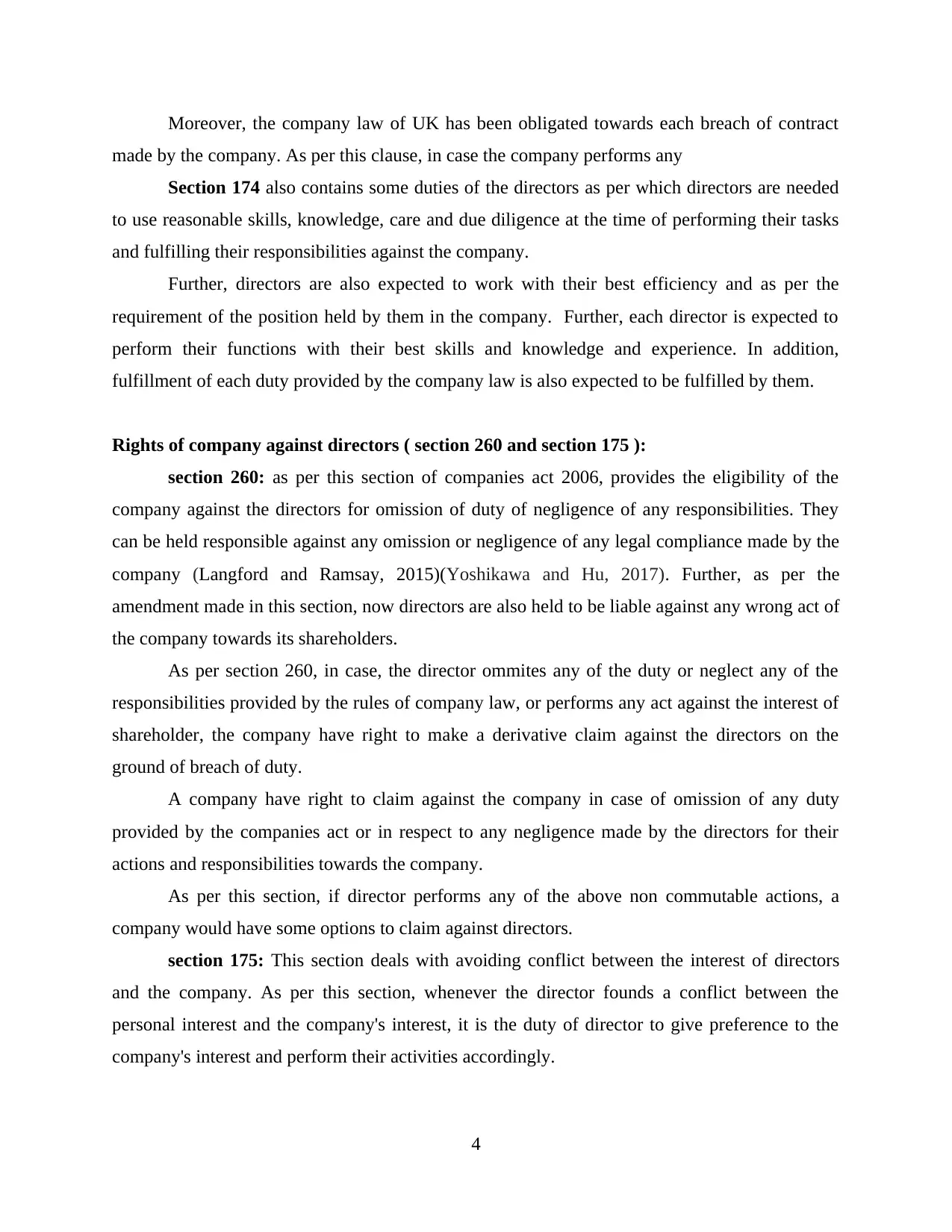
Moreover, the company law of UK has been obligated towards each breach of contract
made by the company. As per this clause, in case the company performs any
Section 174 also contains some duties of the directors as per which directors are needed
to use reasonable skills, knowledge, care and due diligence at the time of performing their tasks
and fulfilling their responsibilities against the company.
Further, directors are also expected to work with their best efficiency and as per the
requirement of the position held by them in the company. Further, each director is expected to
perform their functions with their best skills and knowledge and experience. In addition,
fulfillment of each duty provided by the company law is also expected to be fulfilled by them.
Rights of company against directors ( section 260 and section 175 ):
section 260: as per this section of companies act 2006, provides the eligibility of the
company against the directors for omission of duty of negligence of any responsibilities. They
can be held responsible against any omission or negligence of any legal compliance made by the
company (Langford and Ramsay, 2015)(Yoshikawa and Hu, 2017). Further, as per the
amendment made in this section, now directors are also held to be liable against any wrong act of
the company towards its shareholders.
As per section 260, in case, the director ommites any of the duty or neglect any of the
responsibilities provided by the rules of company law, or performs any act against the interest of
shareholder, the company have right to make a derivative claim against the directors on the
ground of breach of duty.
A company have right to claim against the company in case of omission of any duty
provided by the companies act or in respect to any negligence made by the directors for their
actions and responsibilities towards the company.
As per this section, if director performs any of the above non commutable actions, a
company would have some options to claim against directors.
section 175: This section deals with avoiding conflict between the interest of directors
and the company. As per this section, whenever the director founds a conflict between the
personal interest and the company's interest, it is the duty of director to give preference to the
company's interest and perform their activities accordingly.
4
made by the company. As per this clause, in case the company performs any
Section 174 also contains some duties of the directors as per which directors are needed
to use reasonable skills, knowledge, care and due diligence at the time of performing their tasks
and fulfilling their responsibilities against the company.
Further, directors are also expected to work with their best efficiency and as per the
requirement of the position held by them in the company. Further, each director is expected to
perform their functions with their best skills and knowledge and experience. In addition,
fulfillment of each duty provided by the company law is also expected to be fulfilled by them.
Rights of company against directors ( section 260 and section 175 ):
section 260: as per this section of companies act 2006, provides the eligibility of the
company against the directors for omission of duty of negligence of any responsibilities. They
can be held responsible against any omission or negligence of any legal compliance made by the
company (Langford and Ramsay, 2015)(Yoshikawa and Hu, 2017). Further, as per the
amendment made in this section, now directors are also held to be liable against any wrong act of
the company towards its shareholders.
As per section 260, in case, the director ommites any of the duty or neglect any of the
responsibilities provided by the rules of company law, or performs any act against the interest of
shareholder, the company have right to make a derivative claim against the directors on the
ground of breach of duty.
A company have right to claim against the company in case of omission of any duty
provided by the companies act or in respect to any negligence made by the directors for their
actions and responsibilities towards the company.
As per this section, if director performs any of the above non commutable actions, a
company would have some options to claim against directors.
section 175: This section deals with avoiding conflict between the interest of directors
and the company. As per this section, whenever the director founds a conflict between the
personal interest and the company's interest, it is the duty of director to give preference to the
company's interest and perform their activities accordingly.
4
⊘ This is a preview!⊘
Do you want full access?
Subscribe today to unlock all pages.

Trusted by 1+ million students worldwide
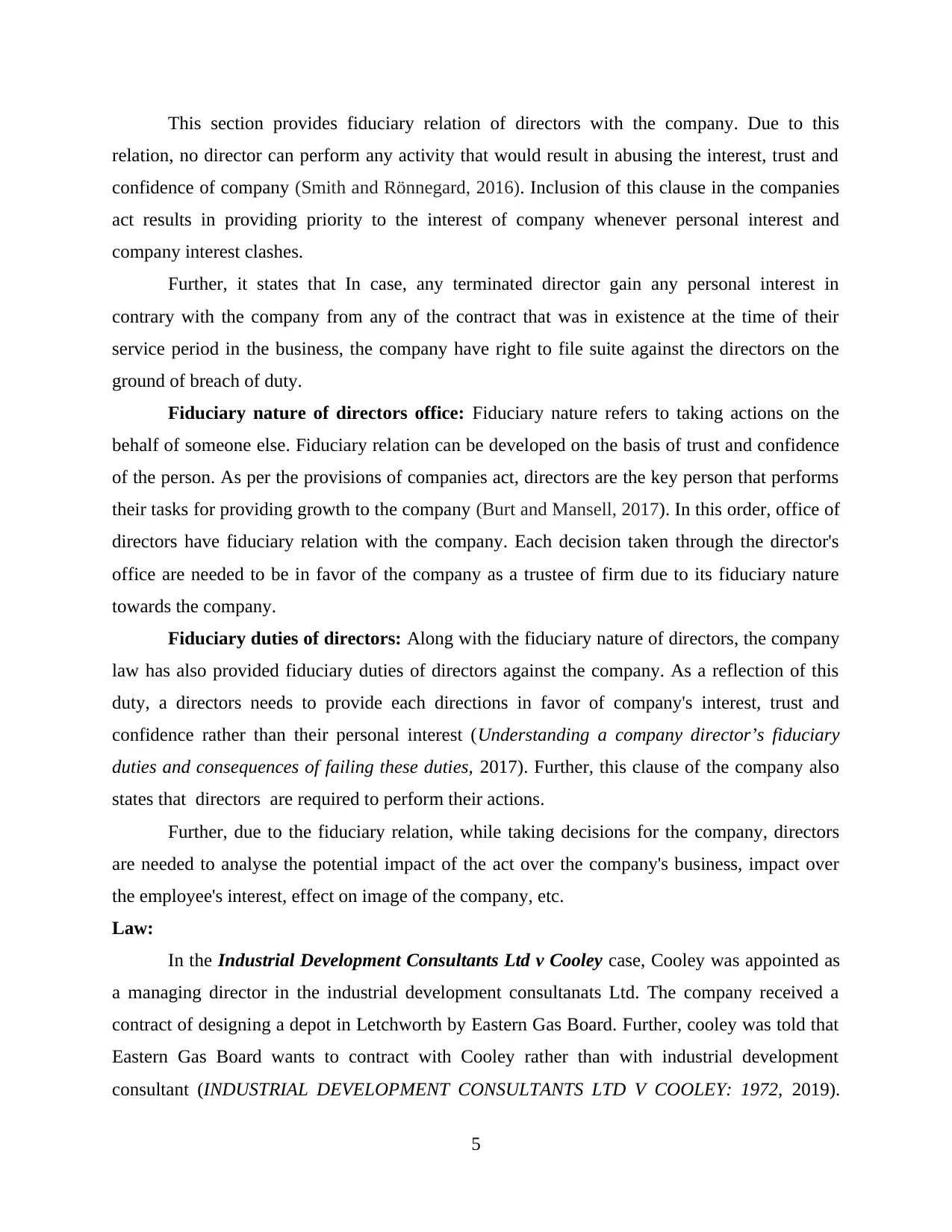
This section provides fiduciary relation of directors with the company. Due to this
relation, no director can perform any activity that would result in abusing the interest, trust and
confidence of company (Smith and Rönnegard, 2016). Inclusion of this clause in the companies
act results in providing priority to the interest of company whenever personal interest and
company interest clashes.
Further, it states that In case, any terminated director gain any personal interest in
contrary with the company from any of the contract that was in existence at the time of their
service period in the business, the company have right to file suite against the directors on the
ground of breach of duty.
Fiduciary nature of directors office: Fiduciary nature refers to taking actions on the
behalf of someone else. Fiduciary relation can be developed on the basis of trust and confidence
of the person. As per the provisions of companies act, directors are the key person that performs
their tasks for providing growth to the company (Burt and Mansell, 2017). In this order, office of
directors have fiduciary relation with the company. Each decision taken through the director's
office are needed to be in favor of the company as a trustee of firm due to its fiduciary nature
towards the company.
Fiduciary duties of directors: Along with the fiduciary nature of directors, the company
law has also provided fiduciary duties of directors against the company. As a reflection of this
duty, a directors needs to provide each directions in favor of company's interest, trust and
confidence rather than their personal interest (Understanding a company director’s fiduciary
duties and consequences of failing these duties, 2017). Further, this clause of the company also
states that directors are required to perform their actions.
Further, due to the fiduciary relation, while taking decisions for the company, directors
are needed to analyse the potential impact of the act over the company's business, impact over
the employee's interest, effect on image of the company, etc.
Law:
In the Industrial Development Consultants Ltd v Cooley case, Cooley was appointed as
a managing director in the industrial development consultanats Ltd. The company received a
contract of designing a depot in Letchworth by Eastern Gas Board. Further, cooley was told that
Eastern Gas Board wants to contract with Cooley rather than with industrial development
consultant (INDUSTRIAL DEVELOPMENT CONSULTANTS LTD V COOLEY: 1972, 2019).
5
relation, no director can perform any activity that would result in abusing the interest, trust and
confidence of company (Smith and Rönnegard, 2016). Inclusion of this clause in the companies
act results in providing priority to the interest of company whenever personal interest and
company interest clashes.
Further, it states that In case, any terminated director gain any personal interest in
contrary with the company from any of the contract that was in existence at the time of their
service period in the business, the company have right to file suite against the directors on the
ground of breach of duty.
Fiduciary nature of directors office: Fiduciary nature refers to taking actions on the
behalf of someone else. Fiduciary relation can be developed on the basis of trust and confidence
of the person. As per the provisions of companies act, directors are the key person that performs
their tasks for providing growth to the company (Burt and Mansell, 2017). In this order, office of
directors have fiduciary relation with the company. Each decision taken through the director's
office are needed to be in favor of the company as a trustee of firm due to its fiduciary nature
towards the company.
Fiduciary duties of directors: Along with the fiduciary nature of directors, the company
law has also provided fiduciary duties of directors against the company. As a reflection of this
duty, a directors needs to provide each directions in favor of company's interest, trust and
confidence rather than their personal interest (Understanding a company director’s fiduciary
duties and consequences of failing these duties, 2017). Further, this clause of the company also
states that directors are required to perform their actions.
Further, due to the fiduciary relation, while taking decisions for the company, directors
are needed to analyse the potential impact of the act over the company's business, impact over
the employee's interest, effect on image of the company, etc.
Law:
In the Industrial Development Consultants Ltd v Cooley case, Cooley was appointed as
a managing director in the industrial development consultanats Ltd. The company received a
contract of designing a depot in Letchworth by Eastern Gas Board. Further, cooley was told that
Eastern Gas Board wants to contract with Cooley rather than with industrial development
consultant (INDUSTRIAL DEVELOPMENT CONSULTANTS LTD V COOLEY: 1972, 2019).
5
Paraphrase This Document
Need a fresh take? Get an instant paraphrase of this document with our AI Paraphraser
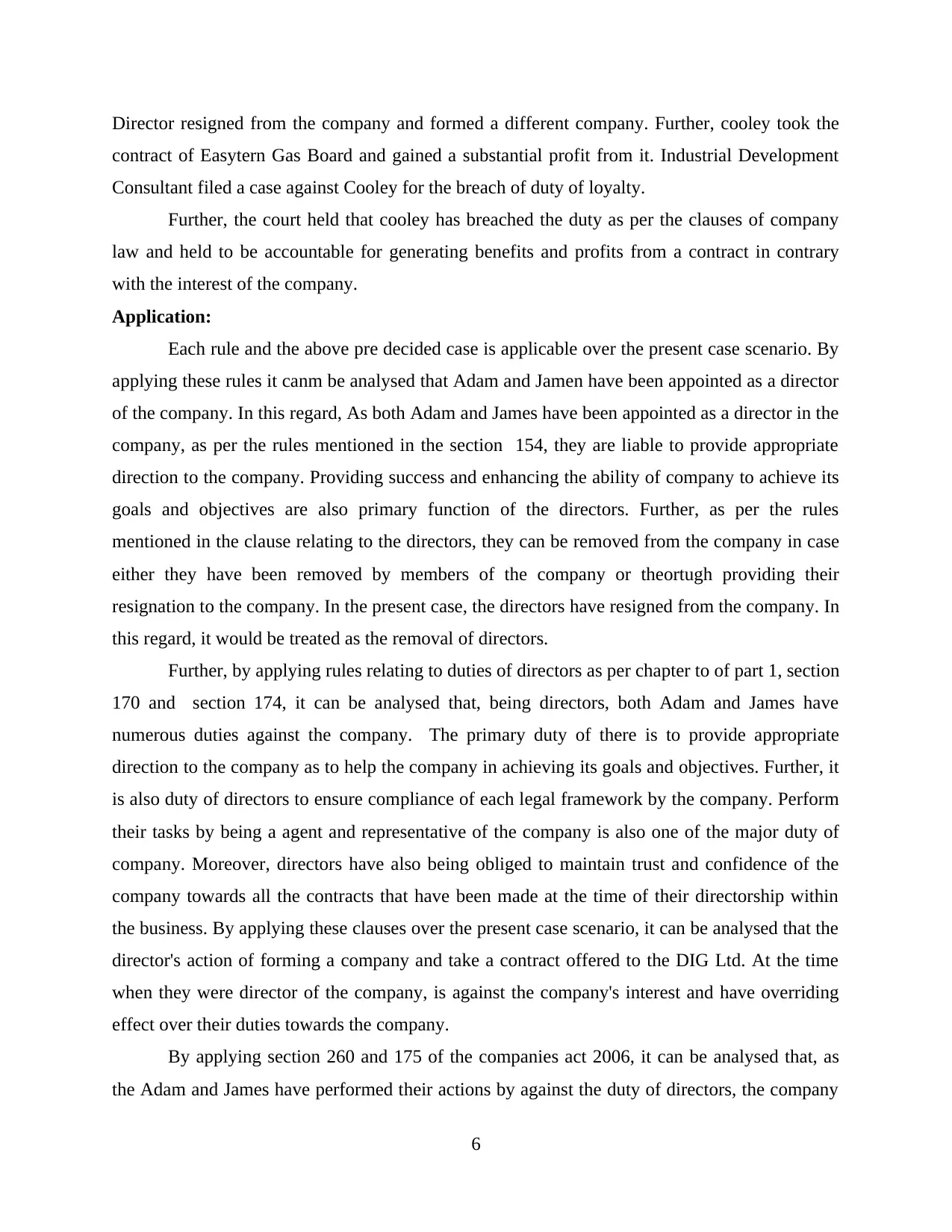
Director resigned from the company and formed a different company. Further, cooley took the
contract of Easytern Gas Board and gained a substantial profit from it. Industrial Development
Consultant filed a case against Cooley for the breach of duty of loyalty.
Further, the court held that cooley has breached the duty as per the clauses of company
law and held to be accountable for generating benefits and profits from a contract in contrary
with the interest of the company.
Application:
Each rule and the above pre decided case is applicable over the present case scenario. By
applying these rules it canm be analysed that Adam and Jamen have been appointed as a director
of the company. In this regard, As both Adam and James have been appointed as a director in the
company, as per the rules mentioned in the section 154, they are liable to provide appropriate
direction to the company. Providing success and enhancing the ability of company to achieve its
goals and objectives are also primary function of the directors. Further, as per the rules
mentioned in the clause relating to the directors, they can be removed from the company in case
either they have been removed by members of the company or theortugh providing their
resignation to the company. In the present case, the directors have resigned from the company. In
this regard, it would be treated as the removal of directors.
Further, by applying rules relating to duties of directors as per chapter to of part 1, section
170 and section 174, it can be analysed that, being directors, both Adam and James have
numerous duties against the company. The primary duty of there is to provide appropriate
direction to the company as to help the company in achieving its goals and objectives. Further, it
is also duty of directors to ensure compliance of each legal framework by the company. Perform
their tasks by being a agent and representative of the company is also one of the major duty of
company. Moreover, directors have also being obliged to maintain trust and confidence of the
company towards all the contracts that have been made at the time of their directorship within
the business. By applying these clauses over the present case scenario, it can be analysed that the
director's action of forming a company and take a contract offered to the DIG Ltd. At the time
when they were director of the company, is against the company's interest and have overriding
effect over their duties towards the company.
By applying section 260 and 175 of the companies act 2006, it can be analysed that, as
the Adam and James have performed their actions by against the duty of directors, the company
6
contract of Easytern Gas Board and gained a substantial profit from it. Industrial Development
Consultant filed a case against Cooley for the breach of duty of loyalty.
Further, the court held that cooley has breached the duty as per the clauses of company
law and held to be accountable for generating benefits and profits from a contract in contrary
with the interest of the company.
Application:
Each rule and the above pre decided case is applicable over the present case scenario. By
applying these rules it canm be analysed that Adam and Jamen have been appointed as a director
of the company. In this regard, As both Adam and James have been appointed as a director in the
company, as per the rules mentioned in the section 154, they are liable to provide appropriate
direction to the company. Providing success and enhancing the ability of company to achieve its
goals and objectives are also primary function of the directors. Further, as per the rules
mentioned in the clause relating to the directors, they can be removed from the company in case
either they have been removed by members of the company or theortugh providing their
resignation to the company. In the present case, the directors have resigned from the company. In
this regard, it would be treated as the removal of directors.
Further, by applying rules relating to duties of directors as per chapter to of part 1, section
170 and section 174, it can be analysed that, being directors, both Adam and James have
numerous duties against the company. The primary duty of there is to provide appropriate
direction to the company as to help the company in achieving its goals and objectives. Further, it
is also duty of directors to ensure compliance of each legal framework by the company. Perform
their tasks by being a agent and representative of the company is also one of the major duty of
company. Moreover, directors have also being obliged to maintain trust and confidence of the
company towards all the contracts that have been made at the time of their directorship within
the business. By applying these clauses over the present case scenario, it can be analysed that the
director's action of forming a company and take a contract offered to the DIG Ltd. At the time
when they were director of the company, is against the company's interest and have overriding
effect over their duties towards the company.
By applying section 260 and 175 of the companies act 2006, it can be analysed that, as
the Adam and James have performed their actions by against the duty of directors, the company
6
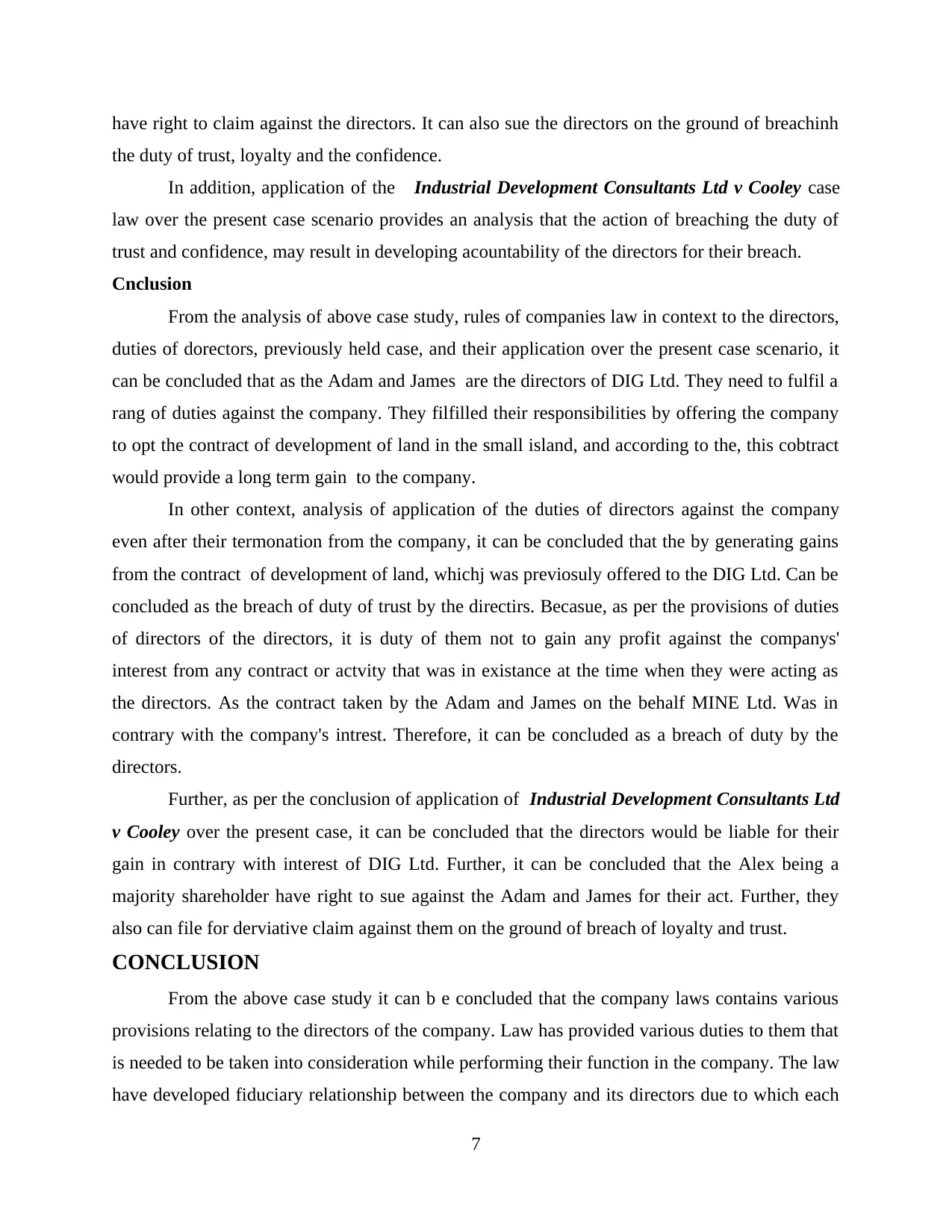
have right to claim against the directors. It can also sue the directors on the ground of breachinh
the duty of trust, loyalty and the confidence.
In addition, application of the Industrial Development Consultants Ltd v Cooley case
law over the present case scenario provides an analysis that the action of breaching the duty of
trust and confidence, may result in developing acountability of the directors for their breach.
Cnclusion
From the analysis of above case study, rules of companies law in context to the directors,
duties of dorectors, previously held case, and their application over the present case scenario, it
can be concluded that as the Adam and James are the directors of DIG Ltd. They need to fulfil a
rang of duties against the company. They filfilled their responsibilities by offering the company
to opt the contract of development of land in the small island, and according to the, this cobtract
would provide a long term gain to the company.
In other context, analysis of application of the duties of directors against the company
even after their termonation from the company, it can be concluded that the by generating gains
from the contract of development of land, whichj was previosuly offered to the DIG Ltd. Can be
concluded as the breach of duty of trust by the directirs. Becasue, as per the provisions of duties
of directors of the directors, it is duty of them not to gain any profit against the companys'
interest from any contract or actvity that was in existance at the time when they were acting as
the directors. As the contract taken by the Adam and James on the behalf MINE Ltd. Was in
contrary with the company's intrest. Therefore, it can be concluded as a breach of duty by the
directors.
Further, as per the conclusion of application of Industrial Development Consultants Ltd
v Cooley over the present case, it can be concluded that the directors would be liable for their
gain in contrary with interest of DIG Ltd. Further, it can be concluded that the Alex being a
majority shareholder have right to sue against the Adam and James for their act. Further, they
also can file for derviative claim against them on the ground of breach of loyalty and trust.
CONCLUSION
From the above case study it can b e concluded that the company laws contains various
provisions relating to the directors of the company. Law has provided various duties to them that
is needed to be taken into consideration while performing their function in the company. The law
have developed fiduciary relationship between the company and its directors due to which each
7
the duty of trust, loyalty and the confidence.
In addition, application of the Industrial Development Consultants Ltd v Cooley case
law over the present case scenario provides an analysis that the action of breaching the duty of
trust and confidence, may result in developing acountability of the directors for their breach.
Cnclusion
From the analysis of above case study, rules of companies law in context to the directors,
duties of dorectors, previously held case, and their application over the present case scenario, it
can be concluded that as the Adam and James are the directors of DIG Ltd. They need to fulfil a
rang of duties against the company. They filfilled their responsibilities by offering the company
to opt the contract of development of land in the small island, and according to the, this cobtract
would provide a long term gain to the company.
In other context, analysis of application of the duties of directors against the company
even after their termonation from the company, it can be concluded that the by generating gains
from the contract of development of land, whichj was previosuly offered to the DIG Ltd. Can be
concluded as the breach of duty of trust by the directirs. Becasue, as per the provisions of duties
of directors of the directors, it is duty of them not to gain any profit against the companys'
interest from any contract or actvity that was in existance at the time when they were acting as
the directors. As the contract taken by the Adam and James on the behalf MINE Ltd. Was in
contrary with the company's intrest. Therefore, it can be concluded as a breach of duty by the
directors.
Further, as per the conclusion of application of Industrial Development Consultants Ltd
v Cooley over the present case, it can be concluded that the directors would be liable for their
gain in contrary with interest of DIG Ltd. Further, it can be concluded that the Alex being a
majority shareholder have right to sue against the Adam and James for their act. Further, they
also can file for derviative claim against them on the ground of breach of loyalty and trust.
CONCLUSION
From the above case study it can b e concluded that the company laws contains various
provisions relating to the directors of the company. Law has provided various duties to them that
is needed to be taken into consideration while performing their function in the company. The law
have developed fiduciary relationship between the company and its directors due to which each
7
⊘ This is a preview!⊘
Do you want full access?
Subscribe today to unlock all pages.

Trusted by 1+ million students worldwide
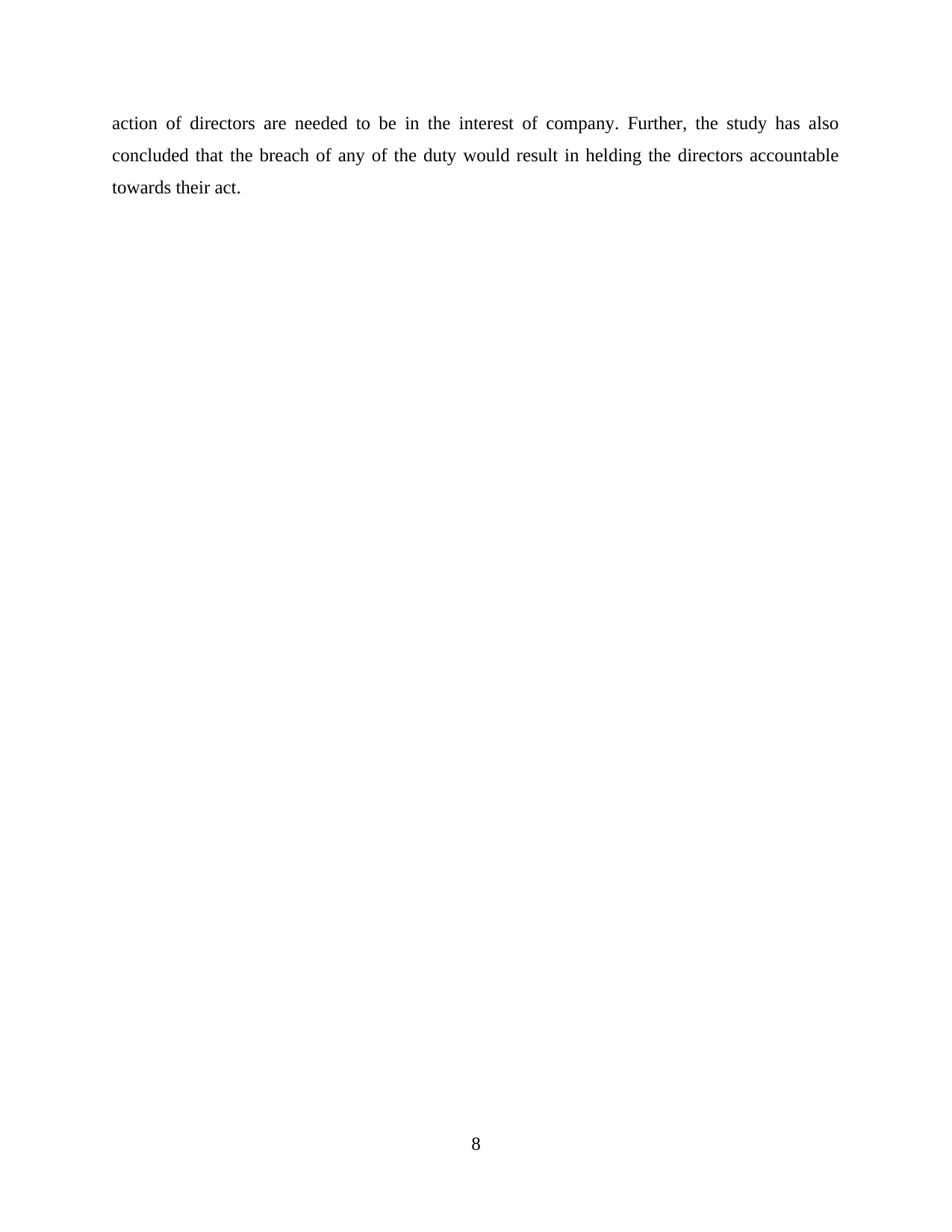
action of directors are needed to be in the interest of company. Further, the study has also
concluded that the breach of any of the duty would result in helding the directors accountable
towards their act.
8
concluded that the breach of any of the duty would result in helding the directors accountable
towards their act.
8
Paraphrase This Document
Need a fresh take? Get an instant paraphrase of this document with our AI Paraphraser
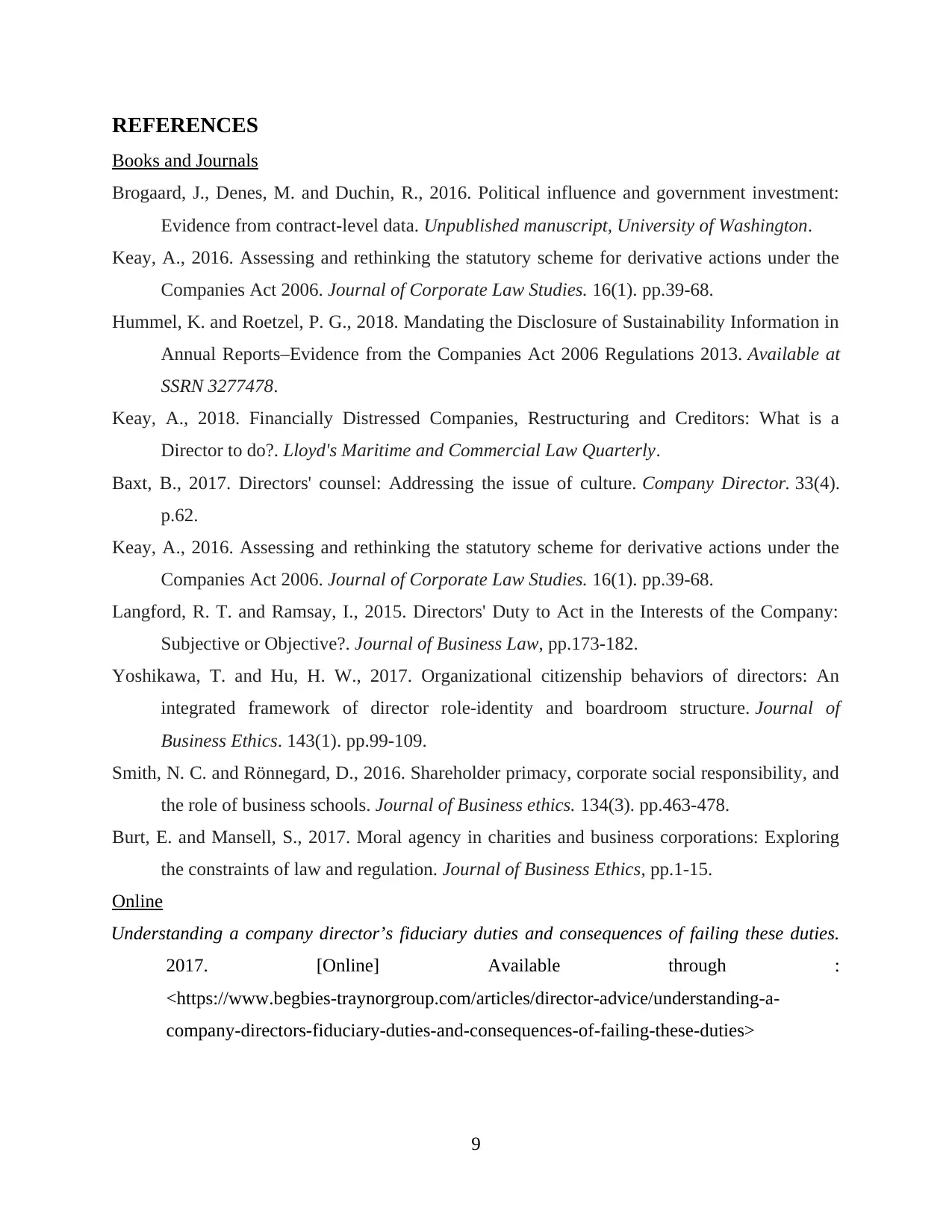
REFERENCES
Books and Journals
Brogaard, J., Denes, M. and Duchin, R., 2016. Political influence and government investment:
Evidence from contract-level data. Unpublished manuscript, University of Washington.
Keay, A., 2016. Assessing and rethinking the statutory scheme for derivative actions under the
Companies Act 2006. Journal of Corporate Law Studies. 16(1). pp.39-68.
Hummel, K. and Roetzel, P. G., 2018. Mandating the Disclosure of Sustainability Information in
Annual Reports–Evidence from the Companies Act 2006 Regulations 2013. Available at
SSRN 3277478.
Keay, A., 2018. Financially Distressed Companies, Restructuring and Creditors: What is a
Director to do?. Lloyd's Maritime and Commercial Law Quarterly.
Baxt, B., 2017. Directors' counsel: Addressing the issue of culture. Company Director. 33(4).
p.62.
Keay, A., 2016. Assessing and rethinking the statutory scheme for derivative actions under the
Companies Act 2006. Journal of Corporate Law Studies. 16(1). pp.39-68.
Langford, R. T. and Ramsay, I., 2015. Directors' Duty to Act in the Interests of the Company:
Subjective or Objective?. Journal of Business Law, pp.173-182.
Yoshikawa, T. and Hu, H. W., 2017. Organizational citizenship behaviors of directors: An
integrated framework of director role-identity and boardroom structure. Journal of
Business Ethics. 143(1). pp.99-109.
Smith, N. C. and Rönnegard, D., 2016. Shareholder primacy, corporate social responsibility, and
the role of business schools. Journal of Business ethics. 134(3). pp.463-478.
Burt, E. and Mansell, S., 2017. Moral agency in charities and business corporations: Exploring
the constraints of law and regulation. Journal of Business Ethics, pp.1-15.
Online
Understanding a company director’s fiduciary duties and consequences of failing these duties.
2017. [Online] Available through :
<https://www.begbies-traynorgroup.com/articles/director-advice/understanding-a-
company-directors-fiduciary-duties-and-consequences-of-failing-these-duties>
9
Books and Journals
Brogaard, J., Denes, M. and Duchin, R., 2016. Political influence and government investment:
Evidence from contract-level data. Unpublished manuscript, University of Washington.
Keay, A., 2016. Assessing and rethinking the statutory scheme for derivative actions under the
Companies Act 2006. Journal of Corporate Law Studies. 16(1). pp.39-68.
Hummel, K. and Roetzel, P. G., 2018. Mandating the Disclosure of Sustainability Information in
Annual Reports–Evidence from the Companies Act 2006 Regulations 2013. Available at
SSRN 3277478.
Keay, A., 2018. Financially Distressed Companies, Restructuring and Creditors: What is a
Director to do?. Lloyd's Maritime and Commercial Law Quarterly.
Baxt, B., 2017. Directors' counsel: Addressing the issue of culture. Company Director. 33(4).
p.62.
Keay, A., 2016. Assessing and rethinking the statutory scheme for derivative actions under the
Companies Act 2006. Journal of Corporate Law Studies. 16(1). pp.39-68.
Langford, R. T. and Ramsay, I., 2015. Directors' Duty to Act in the Interests of the Company:
Subjective or Objective?. Journal of Business Law, pp.173-182.
Yoshikawa, T. and Hu, H. W., 2017. Organizational citizenship behaviors of directors: An
integrated framework of director role-identity and boardroom structure. Journal of
Business Ethics. 143(1). pp.99-109.
Smith, N. C. and Rönnegard, D., 2016. Shareholder primacy, corporate social responsibility, and
the role of business schools. Journal of Business ethics. 134(3). pp.463-478.
Burt, E. and Mansell, S., 2017. Moral agency in charities and business corporations: Exploring
the constraints of law and regulation. Journal of Business Ethics, pp.1-15.
Online
Understanding a company director’s fiduciary duties and consequences of failing these duties.
2017. [Online] Available through :
<https://www.begbies-traynorgroup.com/articles/director-advice/understanding-a-
company-directors-fiduciary-duties-and-consequences-of-failing-these-duties>
9
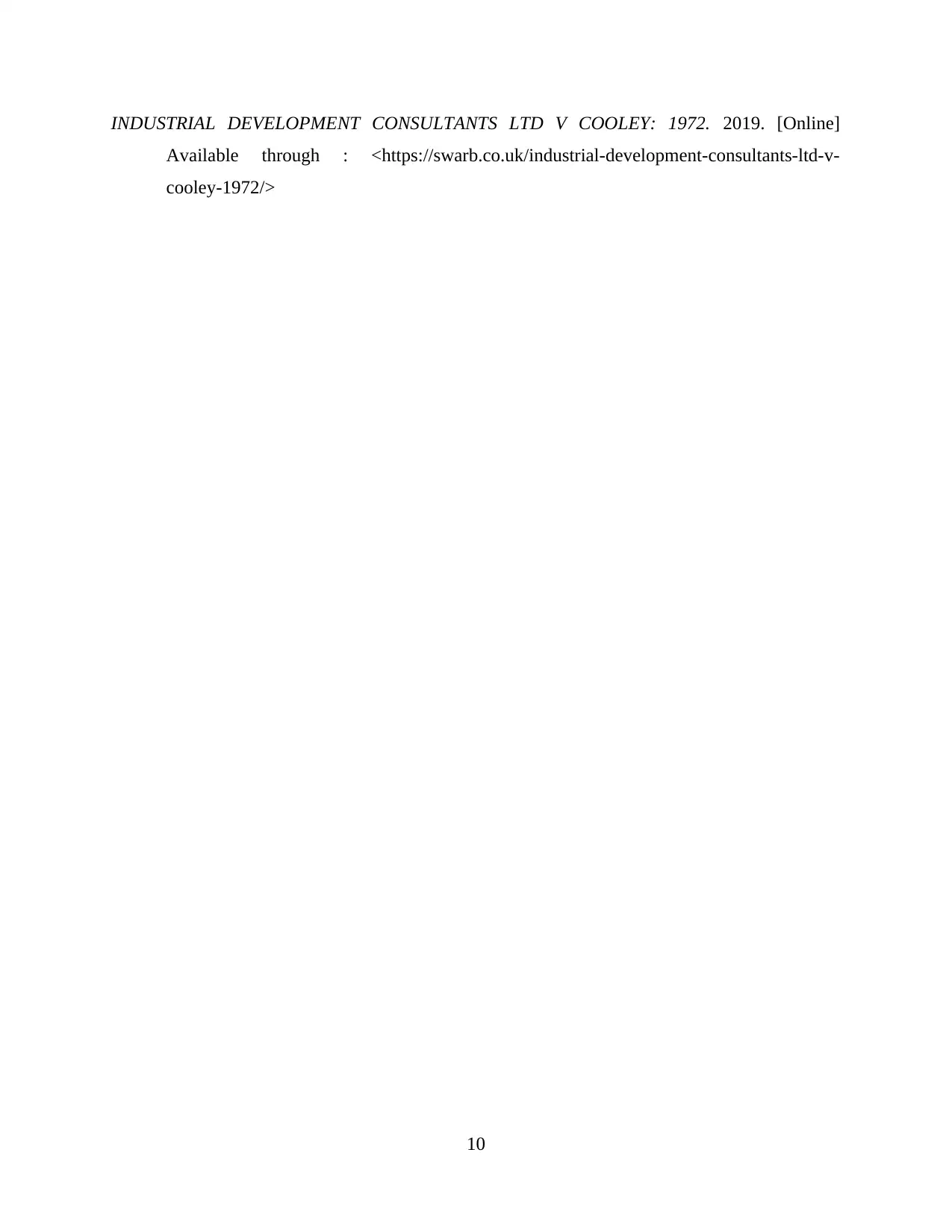
INDUSTRIAL DEVELOPMENT CONSULTANTS LTD V COOLEY: 1972. 2019. [Online]
Available through : <https://swarb.co.uk/industrial-development-consultants-ltd-v-
cooley-1972/>
10
Available through : <https://swarb.co.uk/industrial-development-consultants-ltd-v-
cooley-1972/>
10
⊘ This is a preview!⊘
Do you want full access?
Subscribe today to unlock all pages.

Trusted by 1+ million students worldwide
1 out of 12
Related Documents
Your All-in-One AI-Powered Toolkit for Academic Success.
+13062052269
info@desklib.com
Available 24*7 on WhatsApp / Email
![[object Object]](/_next/static/media/star-bottom.7253800d.svg)
Unlock your academic potential
Copyright © 2020–2025 A2Z Services. All Rights Reserved. Developed and managed by ZUCOL.



